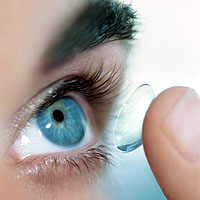|
 Contact Lenses Contact Lenses
Our
practice is specifically, equipped to provide the contact lens patient
with nothing but the finest in professional care. We have successfully
treated thousands of patients with contact lenses, including many who
were previously told they could not wear contact lenses. We
specializes in fitting “hard to fit” cases.
Times
Have Changed
Contact lenses are not what they used to be... even two years ago.
Technological advances have greatly improved contact lenses and lens
care products – revolutionizing vision correction.
Contact lenses can now treat a variety of conditions for which you may
have previously been told that contacts would not work.
We
can now treat those with astigmatism, replace bifocal glasses, and
even change or enhance your eye color. Disposable lenses have
eliminated cleaning and everyday handling. Daily wear and
flexible-wear lenses are safer and more comfortable than ever.
Although traditional "hard lenses" are almost extinct, today's
technology, means that theses lenses are now made from materials that
allow oxygen to pass freely to the eye, allowing it to breathe more
than ever before – whether you wear soft contacts or rigid oxygen
permeable.
If
you have ever thought about contacts, were told you couldn't wear
them... or stopped wearing them for some reason... reconsider
contacts, and consider us, they're not what they used to be!
Vision Conditions Now Treated With Contacts
For children and adults, most vision conditions can now be treated
with contact lenses – even those which could not be treated
successfully even a few years ago.
Some
of the most common conditions we can now treat with contacts include
myopia (nearsightedness), hyperopia (farsightedness), astigmatism, and
presbyopia (loss of up-close focusing).
Contact Lenses for the 'Forty-Something Syndrome'
As
baby boomers continue to age, many of us will be affected by
presbyopia (the inability to focus up-close).
With
the modern contact lens technology available today, your options are
not limited to reading glasses, bifocal or progressive lenses for your
spectacles for correcting your vision.
Contact lenses available for the presbyopic patient come in a variety
of "patterns", combining lens areas for near and distance vision. Let
us solve your “forty something” reading problems.
Sports
Being active and participating in sports is often inconvenient, or
even impractical, when wearing glasses.
Glasses get in the way; they fall off; they fog up... or they get
broken.
Contact lenses have come to the rescue – ranging from professional
athletes to little leaguers. Contacts can be worn with safety glasses
when appropriate. They are great for water sports as well.
Children
While there are numerous benefits to fitting children with contacts –
particularly the fact that they are less inclined to remove their
lenses as they are to take their glasses off during the school day.\
Nonetheless, there are many other factors to consider when a child
expresses interest in wearing contact lenses. Is the child motivated
enough to accept responsibility for the lenses? Is the child's hygiene
indicative of properly maintaining the lenses to avoid contamination?
Spend some time with your child to discuss the pros and cons of
contacts in your family.
The Contact Lens Examination
A
contact lens examination is a bit different than an examination for
eye glasses. We need to first determine if you can wear contact
lenses, and then which type would best correct your visual problem.
A contact lens examination is quite extensive. We will need to ask you
some specific questions about your lifestyle, any medications or any
allergies you may have. He will also measure the curve of your cornea,
the size and shape of your pupil, eyelid tension, your ability to
produce tears naturally, and overall eye health – all to prescribe the
vision correction that is best for you.
What Should I Consider?
There are many reasons people choose to wear contact lenses – most
often it's for improved looks. But, convenience is also a major
consideration – particularly if you have an active lifestyle and
participate in sports.
While we will make contact lens recommendations based on your
examination results, here are factors for you to consider when talking
with the doctor about contacts:
-
What types of lenses will be most comfortable?
Am I around fumes or a lot of dust on a regular basis?
-
Handling the lenses is a consideration. Are my
fingers nimble and my vision sharp enough to see the lenses when
they're out of my eyes?
-
Does a regimen of cleaning and disinfecting
present any problems? Are disposables better for my lifestyle?
-
Do I want to change or enhance my eye color?
-
Am I committed to following my optometrist’s
directions and to routine follow-up care?
What you Need... When You Need It
Our extensive inventory enables us to fit the majority of contact lens
patients in the office, allowing you to wear your lenses home the same
day. This is particularly convenient when a replacement lens is needed
(and we can overnight express them to you if you're out of town).
|